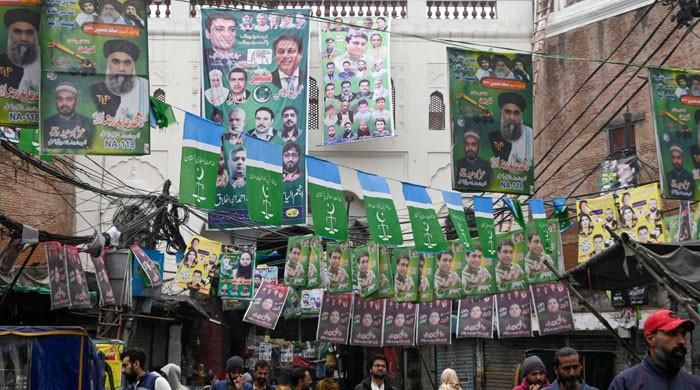No person shall call, hold or attend any public meeting for 48 hours after midnight, says ECP.
- ECP issues notification under section 182 of the Election Act, 2017.
- The candidates warned of legal action for violating the directive.
- The ECP sought the cooperation of the media and the public to ensure fair elections.
In accordance with the electoral laws, the Election Commission of Pakistan (ECP) has announced that the election campaign for the Thursday elections will end at 12 midnight between February 6 and 7, 2024. News reported.
The ECP issued a notification in this regard, citing Section 182 of the Election Act, 2017, which prohibits any political activities after the specified period of time.
Section 182 of the Electoral Act of 2017 reads: “Prohibition of public meetings for a specified period: No person shall convene, hold or attend any public meeting, or promote or join any procession, within the area of a constituency or, in the case of the Senate election, a Province, for a period of forty-eight hours ending at midnight 'after' the conclusion of voting for any election in that constituency or Province.”
Likewise, Article 183 reads: “Punishment for illegal practice: The person guilty of the offense of illegal practice shall be punished with imprisonment for a period which may extend to two years or with a fine which may extend to one hundred thousand rupees or with both. ” .
The ECP warned that any candidate organizing or participating in any gathering, procession, corner meeting or any such political activity after the deadline would face legal action.
The commission sought the cooperation of the media and the public to ensure a free, fair and transparent electoral process.
EMS
Separately, Colonel Saad, ECP's Election Management System (EMS) project director, said on Monday that a special network had been created using all international security standards.
Briefing the media about the EMS here, he dismissed concerns that the system could be hacked or that results could be changed. He explained that the ECP had its own private network and the system was not available on the internet. He ruled out the possibility of hacking the system.
He said only specific people could access the EMS, for which a dedicated network operation center had been established.
“We have also whitelisted the presidents' mobile phones and not everyone will be able to access or use them,” he added. Regarding a letter written by a returning officer (RO) of NA-197, he said that his concerns had been addressed. He said if the RO had contacted the district returning officer or the ECP helpline, his issues would have been addressed sooner. “However, I spoke to him and he later told me that the EMS is working very well,” he added.
He said 3,000 laptops had been made available for EMS and 3,600 software operators had been recruited and trained to facilitate returning officers across the country. The project director said at this point it was difficult to say how much the total cost of the EMS would be. He said it was also not possible to give a final timeline on how long it would take for the results to arrive.
However, he said that five tests were carried out at different stages regarding the EMS and the problems identified or faced in the system had been resolved. He added that satellite connections had also been provided to the ROs.
ECP Info-Tech CEO Khizar Hayat said the EMS technology had been updated and had previously been used in 40 elections. He said the president would send the results to the returning officer through EMS. “If there is any problem in the delivery of the results, the president will personally transmit them to the returning officer. The SME will immediately detect any change in the results,” he added.
The National Operations Centre, he noted, was built in accordance with global standards and several power reserves were created to run the system, while the EMS backup servers are at NADRA. [National Database and Registration Authority]which has 24 years of experience and resources from the government of Pakistan.












